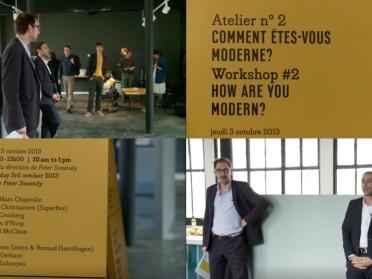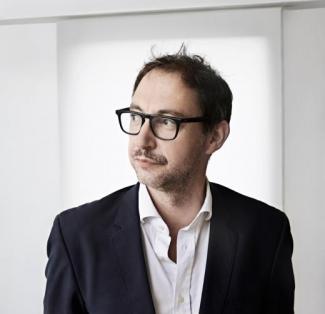
Les Prolégomènes, Day 1 - Workshop n°2 "How are you modern?", October 3rd 2013, Lafayette Anticipations, Paris
Led by Laurent Jeanpierre, with Bless (Désirée Heiss & Ines Kaag), Martin Boyce, Alain Bublex, Emmanuel Guy, Emmanuelle Huynh, Christoph Keller, Alexandre Laumonier and OMA/AMO.
« There has long been much talk of modernity, and yet there is no agreed definition of it. Indeed, that word does not refer to any specific time period, but rather to a set of philosophical questions. Originally, it captured the belief that the future would always be better and freer than the present, indefinitely. Then – but this is only superficially paradoxical – there is the notion that there is nothing new under the sun, i.e. that “we have never been modern”. Over the past decades, this consciousness of the crisis of modernity has been variously referred to as “post-modern”, “second modernity”, “presentism” or “contemporary” (as in contemporary art). But no one can tell whether history is over; whether what we call “the crisis” is really our future; whether our post-modernity can remain futureless for all time. In fact, the discourse about modernity has never been homogeneous. It has always contained its inner contradictions and mirror images. Though always purporting to represent a clean break from the past, it has adduced many different criteria: industry and the market, technology and liberty, art and commodities, democracy and violence, repetition and acceleration, etc... Modernists believe that they know what modern means. Yet no one knows what is modern and what isn’t. That is the whole problem with modernity. This, however, did not stop the West from using it as a means of distinguishing itself from the rest of the world, justifying its conquests and, later on, its brutal hegemony.
The belated realization that modernity can also be used as a weapon has given rise to a moral and political debate: can we, and should we, be modern? This, in essence, is what the critics of modernity have been saying (e.g. the environmentalists). Others yet feel that it is important to recognize that there are multiple types of modernity, since each society has forged its own model for fostering human development and articulating historical eras. From that perspective, the lack of harmony across worlds and times, the internal differentiations, constitute the very essence of modern times. Hence the real question, for both individuals and civilizations, is no longer what is modern, but rather how we are modern, or how we can afford to be. It must be posed to artists and designers, since modern philosophy has long held them out as the scouts of modernity, the very cutting edge of modernity. Answering it will require them to explore, as modernists have always done, what the current image of modernity is, whether in Paris, Europe, or the rest of the world. »
— Laurent Jeanpierre
Les Prolégomènes / How are you modern? Workshop #2
